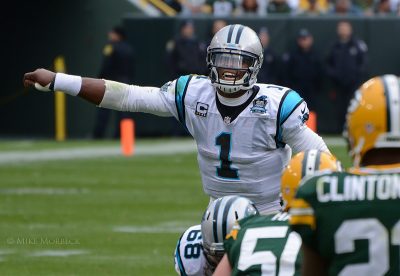
Every NFL season has its fair share of injuries, and the 2016-17 one has been no different. One of the most notable players who has been hobbled thus far is Cam Newton, the Carolina Panthers’ star quarterback. The reigning MVP has battled head injuries all year, taking several vicious helmet-to-helmet hits Week 1 against the defending champion Denver Broncos, and missing a game after suffering a concussion Week 4 against the Atlanta Falcons. Although Newton was cleared to play this Sunday against the New Orleans Saints, many have questioned if the Panthers and the league will do more to protect one of their marquee players.
Newton, for his part, has dismissed much of the criticism surrounding his treatment, stating that injuries such as these as part of the game. After the Week 1 matchup, he told the media, “It’s not my job to question the officials … My focus is trying to win football games through all of the hits and everything else.”
Although Cam did admit that “it’s not fun getting hit in the head,” he chalked the hits up simply to what he referred to repeatedly as “a physical game.” Not everyone was so easily satisfied, with many, including Newton’s father, decrying the NFL for failing to take the necessary precautions implemented to protect players from brain damage.
In the following days, the NFL officials stated that more penalties should have been called and they fined two of the players responsible for the hits, but maintained that Newton did not suffer any significant head trauma.
The ongoing debate on the efforts of the NFL to curb head injuries is one that I feel no need to weigh in on here; many people with more expertise than I have already shed light on the matter. Instead, I want to examine the deep-rooted ideas that make it so hard for professional football executives, fans and even players to take seriously the toll the game takes on one’s health. Simply put, the idea that our best athletes are somehow indestructible is a huge part of American sports culture, and this makes it harder to accept the fact that even their bodies have limits.
The most recent example of this is a new Snapchat game from Under Armour where users get to play as Cam Newton. The commercial for the game, being aired during NFL football, shows Newton running through a forest in Under Armour workout gear, smashing through trees and outrunning wolves. The game works much the same way; players get to maneuver Cam around and burst through obstacles for as long as they can. It is similar in format to many popular mobile games to come before it, and by itself the game is harmless. But it is the underlying idea behind it that can be dangerous.
This ad and others like it show athletes as possessing superhuman physical capabilities, whether it be strength, speed or endurance. They tell us that with enough training, people become unstoppable. And there is no athlete today who better represents this fallacy better than Cam Newton.
Newton is 6-foot-5 and 245 pounds, with the arm of a traditional quarterback, the bruising strength of a fullback and the speed of a sprinter. He possesses a physique and set of skills never before seen in football, and can make plays that no one else is able to. Even his nickname shows how his physical skills have been exaggerated to inhuman levels — “Superman.”
But when an athlete is equated to a superhero who can literally deflect bullets, it becomes hard to remember that his body sustains damage the same as the rest of ours. Despite the outcry after Newton’s abuse against the Broncos, many fellow players and members of the media noted and praised Cam’s “toughness” that allowed him to stay in the game. Now Newton is absolutely “tough” in the sense that he can endure tremendous pain and physical punishment, but his brain is affected by car crash-force collisions the same way as you or me.
Do not underestimate the power of images. Sure, no one is going to really believe that Cam Newton can outrun a wolf or bust through a fully grown oak, but seeing these images over and over make audiences less likely to flinch when Newton is jarred off the goal line by the skull of another 250-pound man.
In the end, the biggest impact these superhero-athlete narratives have are not on the fans, but on the players themselves. With all the hype and praise athletes receive for their skills, it is naive to think that they do not internalize many of the same ideas we do. Perhaps this is the reason Newton is so hesitant to object to the abuse his body takes, and why many players refuse to be taken out of the game even after “having their bell rung.” Newton has been told for so long that he is unbeatable, indestructible; that he is Superman — and showing any sign of weakness would only burst that bubble.
Football is an American institution, and its great players will continue to be revered as long as the game is played. But if we want to protect the players we admire so highly, we the people must appreciate them for what they are: not all-powerful gods, but immensely skilled and incredibly mortal humans.




















































































































